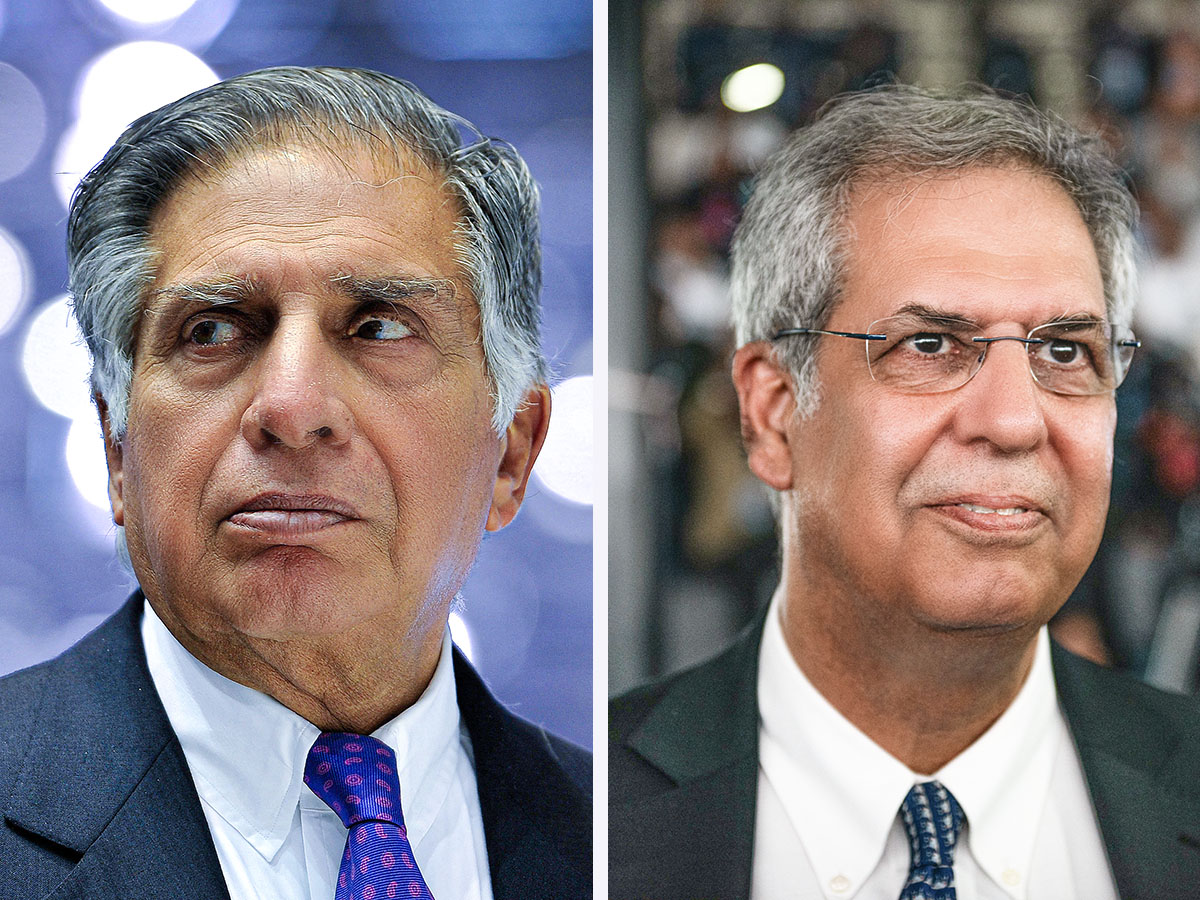 Ratan Tata, Image: Fabrice COFFRINI / AFP and Noel Tata, Image: Amit Verma
Ratan Tata, Image: Fabrice COFFRINI / AFP and Noel Tata, Image: Amit Verma
While the nation mourns the death of Ratan Tata, questions about his successor are swirling once again.
In 1991, following JRD Tata’s hospitalisation due to a heart condition, Ratan Naval Tata took over as chairman of Tata Sons and Tata Trusts. Successions often bring uncertainty, raising questions about whether the new leader can measure up to their predecessor’s standards. He proved sceptics wrong by transforming the Tata Group into a global powerhouse through strategic acquisitions. Under his leadership, the conglomerate expanded aggressively, shaping India’s economic future through global expansion and diversification across various industries, from tea to steel.
After he stepped down as the chairman of Tata Sons in 2012, at 75, the focus shifted to his successor. Ratan Tata had made a choice already, initially choosing Cyrus Mistry; but he was later removed amid a legal battle. The ensuing hostility has also ensured that Shapoor Mistry, who controls the Pallonji Mistry group that holds 18.4 percent stake in Tata Sons, won’t be succeeding Tata.
Following Mistry’s ouster, a selection committee appointed Natarajan Chandrasekaran, then the CEO of TCS, as the chairman of Tata Sons in January 2017. Chandrasekaran, 61, currently has four years left in his tenure.
Even after retiring, Tata retained chairmanship of the trusts permanently. He also separated the roles of the chairman of Tata Sons and the chair of Tata Trusts to prevent one person from heading both institutions.
Sir Dorabji Tata Trust and Sir Ratan Tata Trust are the primary shareholders of Tata Sons, owning nearly 52 percent of the company. Rest of the trusts together own another 14 percent, taking the total holding to 66 percent.
Historically, the leadership of Tata Trusts has been linked to the Tata family and the Parsi community. Ratan Tata’s tenure marked the last time an individual held both the roles of chairman of Tata Sons and Tata Trusts.
Tata Sons is the principal investment holding company and promoter of Tata companies. Sixty-six percent of the equity share capital of Tata Sons is held by philanthropic trusts, which support education, health, livelihood generation, and art and culture. In 2023-24, the revenue of Tata companies was more than $165 billion. Each Tata company operates independently under the guidance and supervision of its own board of directors. There are 26 publicly listed Tata enterprises with a combined market capitalisation of more than $365 billion as of March 2024.
Noel Tata, Ratan Tata’s half-brother and chairman of Trent, is widely seen as a leading candidate. At 67, Noel’s appointment would align with the preference within the Parsi community for a family member to head the trusts. His experience in the Tata Group, spanning more than four decades, adds to his potential candidacy.
Noel Tata’s involvement with the Trusts began in 2019 when he joined as a trustee of the Sir Ratan Tata Trust, followed by his appointment to the board of the Sir Dorabji Tata Trust in 2022. His entry into these roles was interpreted by many as a step towards ensuring continuity in the leadership of Tata Trusts. If selected, Noel would become the 11th chairman of the Sir Dorabji Tata Trust and the sixth chairman of the Sir Ratan Tata Trust, carrying forward a tradition that has often seen Parsis at the helm.
But it’s worth noting that during the legal dispute with Cyrus Mistry, in a submission to the Supreme Court, Ratan Tata had said, “I happen to be the current chairman of these trusts; it could be somebody else, not necessarily with the surname ‘Tata’, in the future. An individual’s life is finite, whereas these organisations will continue.”
Recently, Noel’s children, Leah, Maya, and Neville, were inducted as trustees of five prominent trusts, including affiliates of the Sir Dorabji Tata Trust and Sir Ratan Tata Trust. These trusts, which manage both the charitable and significant financial interests of the Tata Group, are responsible for overseeing the group’s vast stake in Tata Sons. This makes their role within the Trusts not just symbolic but essential to shaping the group’s future governance.
In a goodbye note, the family wrote, “We, his brothers, sisters, and family, take solace and comfort in the outpouring of love and respect from all who admired him. While he is no longer with us in person, his legacy of humility, generosity, and purpose will continue to inspire future generations.”
While Ratan Tata’s enduring legacy will continue, the Tata Group will embark on its next chapter under a new leadership.
